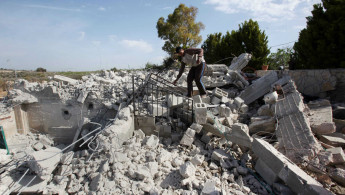Home demolitions in Israel: a new policy?
The demolition of a house in Kafr Kana in Galilee on Sunday night marks the first time in years that a demolition order has been implemented within Israel's 1948 borders.
The demolition has led to calls for a national general strike by Palestinian citizens of Israel who are concerned that the action will lead to further home demolitions.
Kafr Kana declared a general strike, and the National Democratic Alliance Party issued a statement calling for the house to be rebuilt.
Israeli police said the house, which belonged to Tareq Khatib, did not have a building permit. Hundreds of police arrived without notice and surrounded the house after midnight on Sunday. Blocking roads leading to the house, they forced the family to leave the house with some of their possessions, then destroyed it, Khatib told Haaretz.
There were violent confrontations during the night between Palestinians and Israeli police. Police used tear gas to keep local residents away from the site. Nevertheless, residents tried to rebuild the house with help from the local council after the demolition.
"Demolishing the house is a crime and represents a draconian application of an iron fist policy," said Basil Ghattas, Palestinian member of Knesset. Israel is "dealing with Arabs as enemies and raiders, even when they build on their own land, which they inherited from their parents and grandparents, and which is inside or on the borders of the framework map", he said, adding that "this was not even committed by the apartheid regime in South Africa".
Khatib told Haaretz that his house was built without a permit, outside the residential zone of the town's master plan, but pointed out that the government refused to expand this zone, which left him with no choice but to build his home illegally.
"I need a roof over the heads of my five children and I had nowhere to build," he said. "For two years I’ve been in a battle to prevent the demolition and to start the process of getting a permit, but the government insisted on demolishing."
A new policy?
The action in Kafr Kana follows the release of demolition orders for 30 Palestinian homes in Ramleh near Jerusalem, inside Israel, according to the websites of al-Dounia al Watan and al-Qassam, the military wing of Hamas. The owners were handed the demolition orders without being given prior notification.
Arfan Khatib, a local council member and relative of the Kafr Kana home owner, thinks the latest demolition marks a new policy since the recent Israeli elections.
There are another 26 houses built without permits in the area, due to the natural population growth of Kafr Kana and the difficulty in obtaining permits from the local council, he told Haaretz. "Some of the neighborhoods look like refugee camps," he said.
Kafr Kana's local council filed for expansion plans and several times requested approval from the Interior Ministry and regional planning authorities, but the applications were rejected.
If approval had been given, the Khatibs' house would have been legally built on their own land, which is a natural extension of the neighbourhood, the head of the local council, Majhad Awawdeh, told Haaretz.
"Bigger Picture"
Whether the Kafr Kana and Ramla demolition orders mark a new policy since the recent election in Israel, Shawan Jabarin, head of human rights group al-Haq, points out that land issues are part of a bigger picture in which "discrimination against Palestinians inside the green line is systematic and part of Israel's policy".
"Israeli settlers build new houses in the occupied West Bank and the government provides electricity and water... It is a war crime to transfer settlers to occupied territory," he told al-Araby al-Jadeed. "At the same time, Arabs inside Israel, who have citizenship are discriminated against, especially in planning issues, such as with the unrecognised villages."
Discrimination against Palestinians in Israel in relation to land and planning rights dates back Israel dates to the 1950s absentees' property law, according to Adalah, the Legal Centre for Arab Minority Rights in Israel. This allowed Israel to seize land owned by Palestinians forced to flee in 1948, and it has continued to use discriminatory land distribution policies since then.
"While over 1,000 new Jewish communities have been established, not a single Arab settlement has been authorized," Adalah ntes on its website. "Jewish settlements in the Naqab are retroactively recognised, while Bedouin villages that pre-date Israel's independence are not – left without water, electricity, or infrastructure."
Israel's settlements in occupied Palestinian territory are illegal according to article 49 of the fourth Geneva Convention adopted in 1949. They are frequently condemned at the UN and are seen as an obstacle to any peace agreement.
Palestinians with Israeli citizenship own 5 percent of land within Israel but constitute around 20 percent of the population. Israel's policy of demolishing Palestinian homes in the occupied territories has been heavily criticised by human rights organisations. The demolition in Kafr Kana suggests that having Israeli citizenship does not protect Palestinians within Israel from them either.



